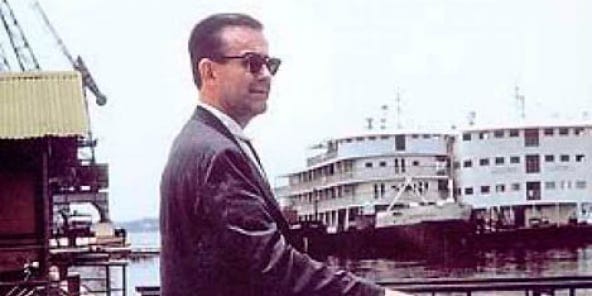Bungle in the Jungle
CIA schemes, Washington intrigue explored in riveting new US-Congo histories
First I have to tell you a story.
On a late autumn day in 1993, I went to see legendary former CIA station chief Larry Devlin at his apartment in Washington, D.C. It would be the first and last time we would meet.
Nothing if not gracious, Devlin greeted me at the door of his comfortable place, pointed toward the living room and then vanished, only to reappear with a pair of brimming martinis, never spilling a drop as he glided toward my chair across more than 40 feet of burnished parquet.
Then in his 70s, Devlin had long since retired from the agency after famously serving in Congo, where he befriended Colonel Joseph Desiré Mobutu, later known as the dictator Mobutu Sese Seko. Mobutu played a crucial, behind the scenes role after independence in 1960, as the key figure in a coup that led to his appointment as Army Chief of Staff. Mobutu would often break bread at Devlin’s house in the capital, where the duo would go over impending cabinet selections, or foreign policy or how the country needed to cast particular votes in line with U.S. policy at the United Nations. Mobutu later seized full presidential powers in 1965, holding sway over his mineral-rich country — the size of America east of the Mississippi — for more than 30 years.
After a perfunctory toast, the genial Devlin began to interrogate me in a low voice about my own recent encounters with Mobutu—when the supremo received me, then a correspondent for Time magazine, over several days in one of the elaborate palaces dominating his ancestral village, set amid vast jungles just beneath the equator.
Devlin’s reddish, watery eyes glinted through thick glasses (perhaps, I thought, with emotion), when I let him know that Mobutu had asked me to pass along his warm regards.
Devlin, arriving in Congo only days after it gained independence in June 1960, witnessed a violent struggle for power as he maneuvered to curtail the role of Patrice Lumumba, the country’s first prime minister, a charismatic and mercurial figure considered by some, especially the U.S. State Department and the CIA, as a likely Soviet tool.
To that end, Devlin may have done Mobutu the ultimate favor when he warned him of an impending assassination attempt. But when it came to Lumumba, although Devlin quietly refused to carry out CIA assassination plans, he later encouraged the by-then ousted premier’s transfer into the hands of political enemies who predictably murdered him. Mobutu, apparently keeping friends close and enemies closer, had been an early and trusted military aide to Lumumba, before covertly facilitating the plot that would end his life.
After Mobutu was more firmly entrenched in power, the CIA brought Devlin back to Washington. But before he left, Le Guide, as the dictator was known, drove over to Devlin’s house in a convertible white Chevy Impala with a large photograph of himself bearing the words, “To my old and excellent friend L. Devlin, to whom the Congo and its chief owe so much.”
Utility Player
Back home, the CIA soon sent Devlin off to run the so-called secret war in Laos against North Vietnamese-allied guerrillas, the agency’s largest covert action at the time. Devlin later skippered Langley’s Africa Division and retired in 1974, heading back in 1976 to Congo—by this time renamed Zaire—as the personal hire of Maurice Tempelsman, a major Democratic party donor whose diamond companies did business in Congo. In 1977, Tempelsman’s longtime legal consigliere, JFK aide Theodore Sorenson, was nominated to be CIA director (although the nomination failed).
Balancing a martini glass in one hand with a pen in the other, I managed to wrest back control of my interview from Devlin (or so I thought), and tried to guide him through a discussion of his role in Mobutu’s rise to power. How did Le Guide slip his CIA leash (never that tight) and morph into a king-sized kleptocrat prone to using force against his own subjects? (At the insistence of Devlin, who died at 86 in 2008, our interview was on background only.)
At one point, I asked Devlin whether his backing of Mobutu and decades of subsequent CIA support had been worth the price—as measured in official corruption, torture and the deaths of several million people, many of them in conflicts that Mobutu initiated, abetted, or was unable to prevent, despite his posture as a great national unifier.





